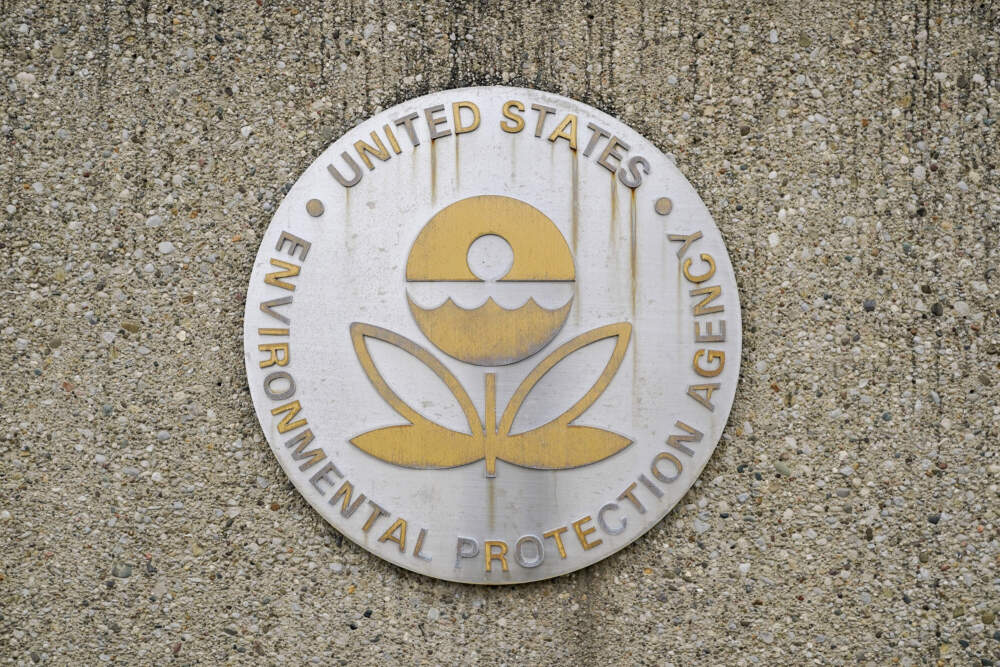Advertisement
EPA will force polluters to pay for PFAS cleanup

The Environmental Protection Agency is designating two PFAS chemicals as “hazardous substances” under the government's Superfund law, allowing federal regulators to force polluters to pay for cleanup of the toxic so-called "forever chemicals."
EPA singled out the two chemicals, PFOS and PFOA, as particularly harmful, stating in recent press release that "there is no level of exposure to these contaminants without risk of health impacts." The designation, released Friday, comes as Massachusetts communities face huge costs to remove PFAS from drinking water.
EPA officials said they will focus on "holding responsible those who significantly contributed to the release of PFAS into the environment," including companies that manufacture PFAS or use it in manufacturing processes, federal facilities and “other industrial parties.” Environmental regulators said they do not intend to sue farmers, water utilities, airports or fire departments that may have inadvertently polluted drinking water supplies by using PFAS-laden products.
The news comes as a relief to local water utilities, who have expressed concern that they might be held liable for PFAS in wastewater.
"The policy certainly makes it clear that water and wastewater utilities should not be held responsible, that they are passive receivers of these substances," said Jennifer Pederson, executive director of the Massachusetts Water Works Association, an industry group. "That's a good first step, but we are certainly interested in a statutory exemption for our water and wastewater utilities, just so they don't get caught up in potential liability down the road."
The EPA can also force the Department of of Defense to clean up PFAS pollution at military bases, which, like Fort Devens and Joint Base Cape Cod, have historically been large sources of PFAS pollution. PFAS chemicals from a fire training site at Joint Base Cape Cod are still leaching into groundwater decades after training took place; the DOD is currently involved in a large-scale cleanup at the base.
The designation also will allow the EPA to use funds to take emergency actions, like providing safe drinking water to communities highly contaminated by PFOA and PFOS. Further, the move lets federal environmental regulators sue the polluters to recover those costs.
"Communities can start breathing a sigh of relief that the federal government, with their state partners, will be stepping up to make their water cleaner and their land cleaner and their air cleaner," said EPA regional administrator David Cash.
"It's a big deal," said Bryan Olson, EPA's director of the Superfund and emergency management division for New England. Olson said he's felt "hamstrung" by the lack of federal rules around PFAS. But now, "we actually are able to order a party that's responsible for the contamination to go do that cleanup, do that investigation. And we haven't been able to do that."
The designation is unlikely to offer quick financial assistance to impacted communities, however.
"This won't provide relief to those who are in the process of constructing and designing systems to remove PFAS today," said Pederson. "Maybe down the line, money would retroactively cover some of those costs. But for now, unfortunately, ratepayers are on the hook for a lot of this."
Environmental advocates applauded the rule, but also said that more stringent regulations are needed.
Advertisement
"This action is particularly important for low-income communities and communities of color who are more likely to live in communities near industrial sites or waste sites highly contaminated with PFAS," said Dana Colihan, co-executive director of Slingshot, a New England-focused environmental health advocacy group.
"That being said, there are literally over 14,000 PFAS out there and the EPA needs to list all of these chemicals as a class under Superfund," she added.
PFAS chemicals were invented in the early 20th century and are used in thousands of products, like waterproof jackets and firefighting foam. Over time, the chemicals wash or flake off these products into landfills, soil and water.
They're often called "forever chemicals" because PFAS molecules don't break down easily. In Massachusetts, they're widespread in ground and surface waters and also in fertilizer made from sewage sludge.
This article was originally published on April 19, 2024.
